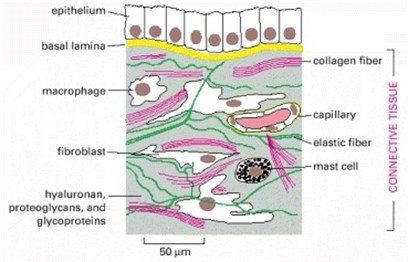One of the most common signs associated with advancing age is wrinkling, thinning, and sagging of the skin.
Several different internal and external processes can contribute to these signs. However, one of the main culprits responsible for the seemingly unavoidable loss of skin vitality that occurs with age is the loss of collagen.
Collagen
Collagen is the main structural protein found in all connective tissues of people and animals. Collagen supports surrounding tissues giving them structural integrity. Collagen is contained within the extracellular matrix of the connective tissue layer underneath the skin, providing strength and form to the skin. We experience this as full, firm, smooth, wrinkle-free skin that bounces back after being stretched.
A closer look at the structure of connective tissue:

Contained within the connective tissue that lies beneath the skin are cells and the extracellular matrix, the “filling” between the cells. The extracellular matrix is comprised of two main components: proteins (including collagen – pictured as pink fibers above) and a fluid or gel-like substance which serves to retain moisture as well as give tissues padding (illustrated in grey above). The gel-like substance is teaming with glycosaminoglycans (GAG’s) which are protein/polysaccharide molecules which act as a lubricant and a shock absorber to the tissues.
Collagen proteins make up 30% of the proteins within the body. Apart from the skin, collagen is also the main structural protein in cartilage, tendons, ligaments, bone, intervertebral discs, etc. Other common complaints with ageing which are related to collagen loss are stiff joints, degeneration of tendons, bone, and discs, and other musculoskeletal issues.
Why do we lose collagen as we age?
Many factors affect our collagen levels. The main culprits are poor nutrition, decreasing hormone levels, stress and excess cortisol, poor hydration, smoking, sun damage, and altered sugar metabolism. This group could be referred to as “collagen killers.”
Factors known to support collagen synthesis are:
- Diet (water, protein, omega three fats, colourful vegetables and fruits containing minerals, antioxidants, and other phytochemicals);
- Hormones (estrogens, phytoestrogens and lower/normal cortisol);
- Lifestyle (exercise, decreased stress and reduce sun exposure);
- Nutrients (e.g. vitamin C, vitamin A);
- Healthy blood insulin and glucose levels
Other processes that contribute to wrinkles:
- Decreased hyaluronic acid and other GAG’s (glycosominoglycans)
- Increased AGE’s (advanced glycation end-products associated with higher simple carbohydrate intake and resultant increased blood sugar levels)
- Increased free radicals (oxidation)
- Increased inflammation (via eicosanoids)
Estrogen
Estrogen increases moisture, elasticity, and thickness (i.e. collagen) of the skin. Estrogen used topically or systemically can increase the production of collagen. Estrogen maintains moisture by increasing GAG’s (glycosaminoglycans) like hyaluronic acid in the gel-like substance of the extracellular matrix. By affecting both structural integrity through collagen synthesis and fluid balance through GAG synthesis, estrogen is a potent protector against wrinkle formation.
Interestingly, there have been studies that indicate that estrogen therapy can restore skin health in ageing skin, but not if it has sustained significant sun damage.
Stress management might possibly be the most important thing one can do to slow the ageing process on the skin and throughout the entire body. |
Another Strike against Stress
Stress adversely affects collagen in that excess cortisol down-regulates the synthesis of collagen. So when we’re going, going, going and not taking the time to rest, reflect and regenerate, our cortisol levels soar and we inadvertently wear down our collagen reserves, resulting in weaker, thinner and less abundant connective tissue throughout the body - including the skin!
Stress with elevated cortisol also indirectly contributes to wrinkling and other factors affecting skin health by increasing free radical formation, inflammation, and AGE formation.
With stress one might experience:
- more oil production leading to acne;
- craving for sweets which leads to higher blood glucose levels and ultimately increased glycation end-products (AGE’s);
- increased inflammatory cytokines which negatively affect wound healing and skin regeneration and may lead to more itching, redness, and swelling;
- enhanced free radical load which damages the skin through oxidation
All of the above lead to skin damage, decreased collagen synthesis, wrinkling, and ageing of the skin. Stress management might possibly be the most important thing one can do to slow the ageing process on the skin and throughout the entire body.
Action Steps – What can you do right now to ensure healthy skin for years to come?
- Assess/test and balance your hormone levels if needed
- Assess/test your cortisol levels and treat accordingly if elevated or otherwise abnormal
- Implement a plan for decreasing stress and managing it appropriately when it does occur
- Eat a well-rounded diet with abundant and varied fruits, vegetables, good fats, and proteins and supplement with vitamins, minerals, antioxidants, and phytonutrients as indicated
- Exercise regularly to increase blood circulation and enhance detoxification through perspiration
- Drink plenty of water
- Stop smoking
- Monitor time spent in the sun, covering up when exposure is strong or prolonged
- Keep your blood sugars in check by eliminating simple sugars from the diet and getting treatment if ongoing issues with insulin resistance or diabetes
Ultimately the steps you take toward enhancing the health of your skin, including optimizing collagen production, are pretty much the same steps recommended for improving energy, mood, memory, weight, and overall vitality. Here’s to looking and feeling your best!
Related Tests
CORTISOL LEVEL TEST ( AWAKENING RESPONSE)


